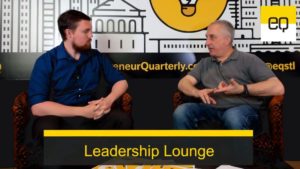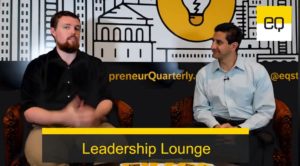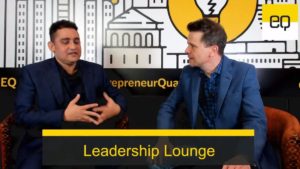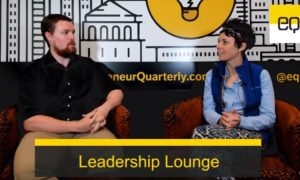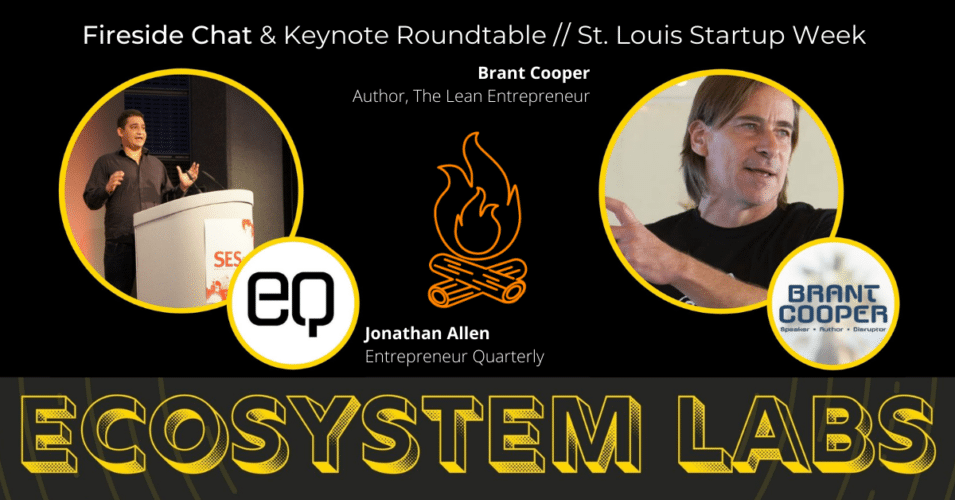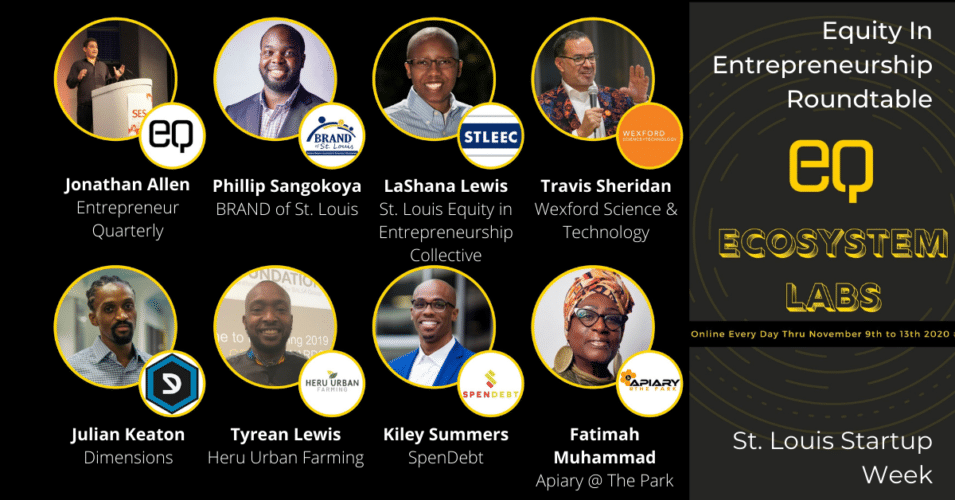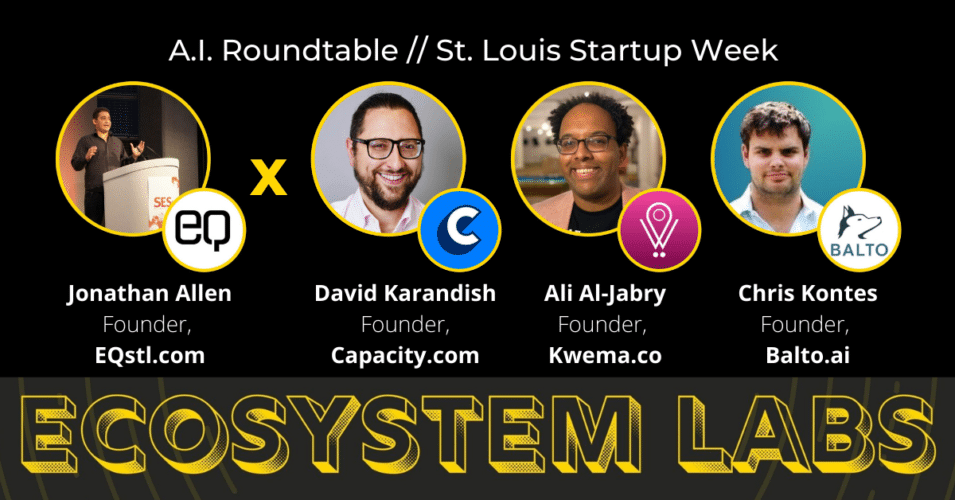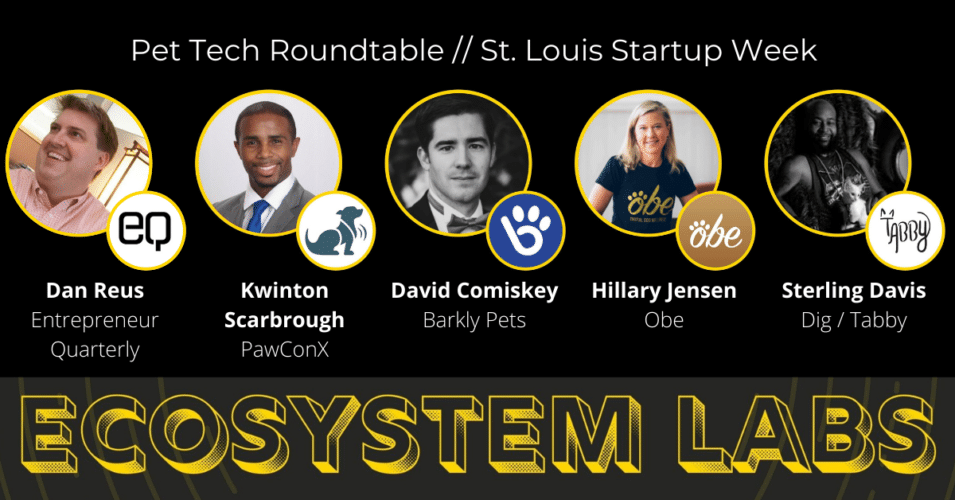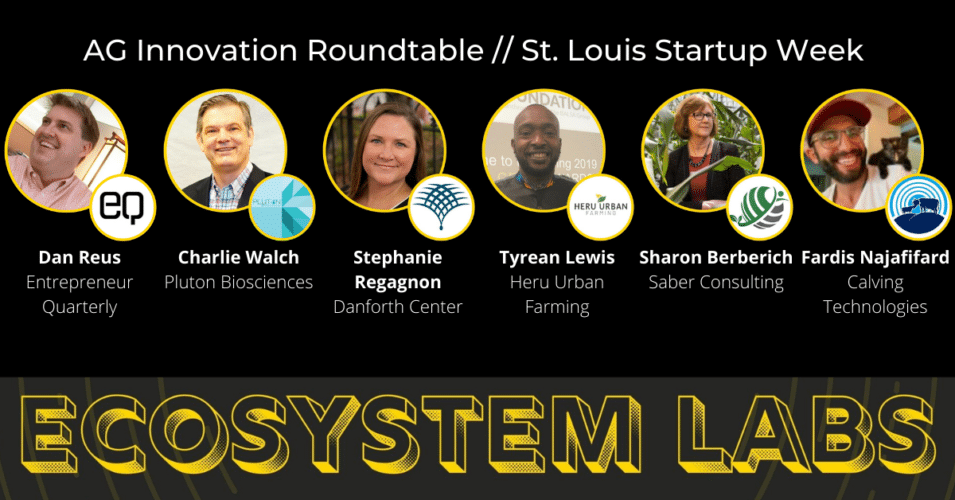
Midwest Digital Marketing Conference: Leadership Lounge Show with Gv Freeman

Writing by Dixie Gillaspie. Dixie Gillaspie is a coach, consultant, firestarter, speaker and co-founder of Return To Your Power. She’s also a confirmed coffee fanatic and allergic to “can’t.” She writes about entrepreneurship, business wisdom, personal branding, and inspiring business leaders on EQ as well as Entrepreneur, Forbes, and Thrive Global.
The Leadership Lounge was a media and connection space set up for EQ Leadership Labs and #MDMC. It was sponsored by okapi and designed by Carlos Suarez and Doug Curtis of Clockwork Productions, who were partners with EQ STL in producing the Leadership Labs event on April 15, 2019.
Doing something truly new and innovative in software is a difficult proposition these days, but sometimes the problem you’re solving really does fall in a software category that has not been previously defined.
Gv Freeman, Founder + Principal at okapi, says they found themselves in that space of category creation somewhat magically. Originally conceived and designed to manage and track ROI in experiential marketing, they soon realized that the platform they had built and the best practices from the experiential world that they had incorporated into that solution, combined with the business intelligence specific to event programs, solved problems in the B2B event world as well.
Even the fact that Freeman was able to secure EventProgramManagement.com is a pretty strong indicator that Event Program Management, as a category, is open for okapi to define and own.
What is “Event Program Management” and Why is it so Hard?
Making decisions about any marketing strategy and plan is difficult, but event programs may be the most stressful to manage. Freeman’s research indicates that the role of Event Marketer is considered the fifth most difficult job, right behind firefighters and police officers. Not only are there a lot of variables to take into consideration, but the logistics and data collection requirements are much more complex and difficult to manage.
Managing an event-based program is different from managing the events themselves. The event program is a series of events your company plans, hosts, or participates in to achieve a defined objective. Those events may be live or virtual, small booths, demos, speaking engagements, or huge conferences or expos. The objective may be brand awareness, lead generation, thought leadership, or education.
An event program management solution then, must be designed to give you the insights to more accurately project and measure ROI. According to Freeman, an event program management solution should help you make decisions like, “Should I go back to an event, what kinds of events are most beneficial to me, maybe opportunities for improvements at those events, collect all the data, drop it into the CRM, and then hopefully track a real ROI over the course of time.”
How are “Insights” Different from Goals?
We all know that goals are important to any plan or strategy, but goals are generally single facts or stats such as the number of people who attended the event or the number of leads collected.
Insights, on the other hand, are all the data points being compared that actually make that data meaningful. It’s the trends and comparisons over multiple events or over time.
Freeman says he educates on the importance of insights a lot. “A goal is ‘I collected a thousand leads,’ but that becomes an insight when I look at the number of leads as it compares to the number of leads closed by sales, or the amount of revenue generated by those leads.

What they’re working toward at okapi, Freeman says, is to give users a lot of ways to “slice and dice the data,” based on categories like campaigns, programs, regions, types of activities and more. It’s not just about collecting data, he adds. It’s about the ability to “Really look at it at a broad spectrum and look at which event types, or which spaces, or really any categories or tags that we want to add to events to look at ROI, that’s the real power of okapi.”
Decision Making is One Headache Solved, Organization is Another
While the right tool for collecting, tracking, and analyzing data makes the decision making aspect of event program management more successful and less painful, it also makes the workflow and logistics part easier.
Freeman’s explanation of how most people are managing the activities and information required for an event program gave me a headache. “People are spending a lot of time managing 15 free applications,” he summarizes, “and we can bring that into one platform and do it at a low cost as well.”
Keeping First Things First, It’s Still About ROI
Not all ROI can be tracked directly to sales. As Freeman says, “It’s hard to track ROI for handing out a one inch by one inch square of pizza at a grocery store.” For those applications where engagement isn’t linked directly to leads, okapi has developed a “relative ROI” formula. Used over a course of time and over multiple events, this formula can project the impact of an event program even without being able to tie leads to sales.
This intelligence acts as what Freeman calls the “canary in the coal mine” to indicate where a product is most likely to perform best based on variables like regions or demographic markets. “The first level of analysis happens kind of automatically in okapi,” he says. “Understanding the ‘why’ behind what is happening.” Then you can dig deeper, bring in data science team, and begin to understand hidden trends and patterns.
The key, Freeman adds, is to standardize your measurement model. okapi includes some standard questions and models, but it can also be set up to match your specific requirements. But using the same model across all of your events is what makes the data comparisons meaningful.

